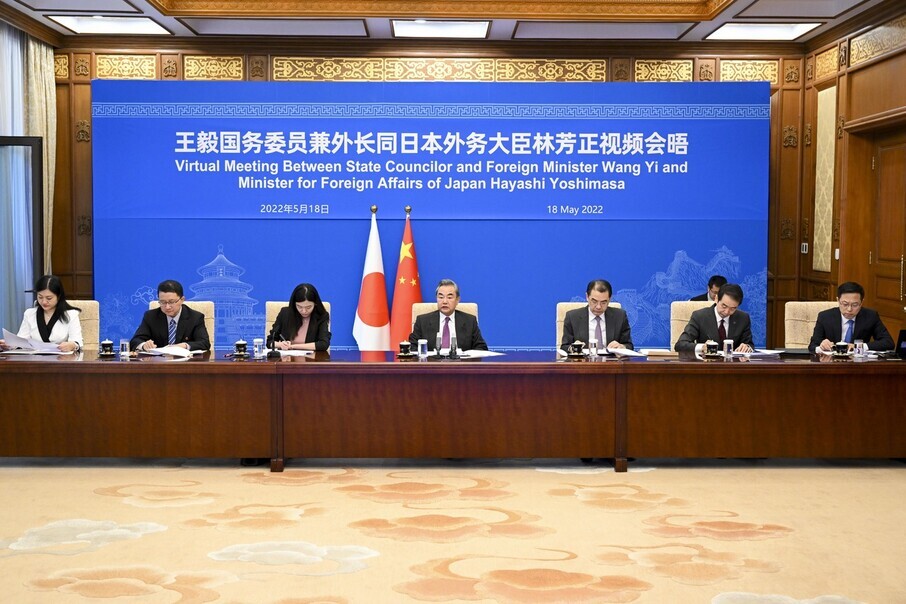hankyoreh
Links to other country sites 다른 나라 사이트 링크
Beijing minces no words warning Japan about cozying up to Washington

“Do not pull chestnuts from the fire for the sake of others, and avoid walking the mistaken path of endangering your neighbor.”
This is part of what Chinese Foreign Minister Wang Yi said during a virtual meeting with Japanese Foreign Minister Yoshimasa Hayashi on Wednesday ahead of US President Joe Biden’s visit to South Korea and Japan. Through his scathing remark directed at Japan’s eager move to assist the US in holding China in check, Wang referred to the US as “others” while referencing China as Japan’s “neighbor” and warned Tokyo against causing harm to Beijing by acting recklessly for the sake of Washington.
During the meeting, Wang didn’t shy away from making unsparing criticisms devoid of any diplomatic rhetoric toward Hayashi. Especially of note, Wang specifically mentioned the Quad, a US-led security partnership including Japan, Australia, and India, saying, “Even before the US leader’s departure [to South Korea and Japan], the argument that the US and Japan should join hands and counter China is causing a foul atmosphere.”
He continued, “The cooperation between the US and Japan should not provoke bloc confrontation and should not cause harm to China’s interests in its sovereignty, security, and development,” adding, “China hopes Japan will learn from historical lessons and bear in mind regional peace and stability and act prudently.”
The last time the Chinese and Japanese foreign ministers met was six months ago, in November of last year.
In regard to diplomatic ties between China and Japan, which mark their 50th anniversary this year, Wang said, “Destabilizing factors must immediately be eliminated,” adding, “Recently, negative activities against China’s core interests and major concerns such as Taiwan have become marked in Japan, and some political forces have discredited and attacked China and damaged our mutual trust, weakening the foundation of the two countries’ relationship.”
Concerning Taiwan, which China considers a “core interest,” Japan had mentioned “the importance of peace and stability across the Taiwan Strait” in its joint statement with the US following its summit with the North American country in April last year. It was the first time Japan touched upon the subject in 52 years, and the statement drew backlash from China.
During the US-Japan summit scheduled for Monday, the two countries are expected to ramp up rhetoric against China and discuss ways to “deter” and “respond to” China’s activities that destabilize the region. Wang’s reference to “some political forces” that have “discredited and attacked China and damaged [China and Japan’s] mutual trust” seems to refer to former Japanese Prime Minister Shinzo Abe, who has been arguing since last year that that the situation in Taiwan should be seen as an emergency for Japan and calls for intervention.
Wang’s statement on Wednesday was much more confrontational than what the Chinese foreign minister was willing to say during his video call with South Korean Foreign Minister Park Jin on Monday. At the time, in regard to South Korea’s potential participation in the Indo-Pacific Economic Framework (IPEF), Wang merely said that China “oppose[s] the negative tendency of decoupling” and that the countries should “maintain the stability and smoothness of the global industrial and supply chains”

In a sense, Wang had expressed China’s discomfort with South Korea’s potential participation in the IPEF in a much more subdued manner, as Seoul has maintained a balance between the US and China as opposed to Tokyo, which has decided to join forces with Washington to contain China both militarily and economically.
But Japan did not bow to China’s aggressive remarks. According to material made public by the Japanese Foreign Ministry, in addressing the Taiwan issue, the foremost battleground of the strategic competition between the US and China, Hayashi repeatedly emphasized “the importance of peace and stability in the Taiwan Strait.”
Additionally, in regard to the conflict in Ukraine, Hayashi pointed out China’s neutral position on the matter, stating that “Russia’s invasion of Ukraine is a clear violation of the UN Charter and international law” and demanding China to “fulfill its role of sustaining international peace and stability.”
The foreign policy and security leaders of the US and China also engaged in a tit-for-tat over the phone. During a Wednesday phone conversation with White House national security advisor Jake Sullivan, Yang Jiechi, a member of the Chinese Communist Party’s Politburo and the director of China’s Office of the Foreign Affairs Commission, said regarding the US’ move to lead initiatives such as the Quad and the IPEF, “Any act that undermines the fundamental and long-term interests of countries in the [Asia-Pacific] region out of selfish interests is short-lived and doomed to fail.”
The White House also issued a readout of Sullivan and Yang’s phone call, which it said “followed their March 14 meeting in Rome.” The Wednesday phone call “focused on regional security issues and nonproliferation” and also touched on “Russia’s war against Ukraine and specific issues in US-China relations,” the White House stated.
The readout did not go into the specifics of Sullivan and Yang’s discussion.
By Choi Hyun-june, Beijing correspondent
Please direct questions or comments to [english@hani.co.kr]

Editorial・opinion
![[Guest essay] Maybe Korea’s rapid population decline is an opportunity, not a crisis [Guest essay] Maybe Korea’s rapid population decline is an opportunity, not a crisis](https://flexible.img.hani.co.kr/flexible/normal/500/300/imgdb/original/2024/0430/9417144634983596.jpg) [Guest essay] Maybe Korea’s rapid population decline is an opportunity, not a crisis
[Guest essay] Maybe Korea’s rapid population decline is an opportunity, not a crisis![[Column] Can Yoon steer diplomacy with Russia, China back on track? [Column] Can Yoon steer diplomacy with Russia, China back on track?](https://flexible.img.hani.co.kr/flexible/normal/500/300/imgdb/original/2024/0430/1617144616798244.jpg) [Column] Can Yoon steer diplomacy with Russia, China back on track?
[Column] Can Yoon steer diplomacy with Russia, China back on track?- [Column] Season 2 of special prosecutor probe may be coming to Korea soon
- [Column] Park Geun-hye déjà vu in Yoon Suk-yeol
- [Editorial] New weight of N. Korea’s nuclear threats makes dialogue all the more urgent
- [Guest essay] The real reason Korea’s new right wants to dub Rhee a founding father
- [Column] ‘Choson’: Is it time we start referring to N. Korea in its own terms?
- [Editorial] Japan’s rewriting of history with Korea has gone too far
- [Column] The president’s questionable capacity for dialogue
- [Column] Are chaebol firms just pizza pies for families to divvy up as they please?
Most viewed articles
- 1Under conservative chief, Korea’s TRC brands teenage wartime massacre victims as traitors
- 2[Guest essay] Maybe Korea’s rapid population decline is an opportunity, not a crisis
- 3Months and months of overdue wages are pushing migrant workers in Korea into debt
- 4[Column] Can Yoon steer diplomacy with Russia, China back on track?
- 5Value of Korean won down 7.3% in 2024, a steeper plunge than during 2008 crisis
- 6After election rout, Yoon’s left with 3 choices for dealing with the opposition
- 7Two factors that’ll decide if Korea’s economy keeps on its upward trend
- 8First meeting between Yoon, Lee in 2 years ends without compromise or agreement
- 9[Editorial] Japan’s removal of forced labor memorial tramples on remembrance, reflection and friends
- 10Strong dollar isn’t all that’s pushing won exchange rate into to 1,400 range